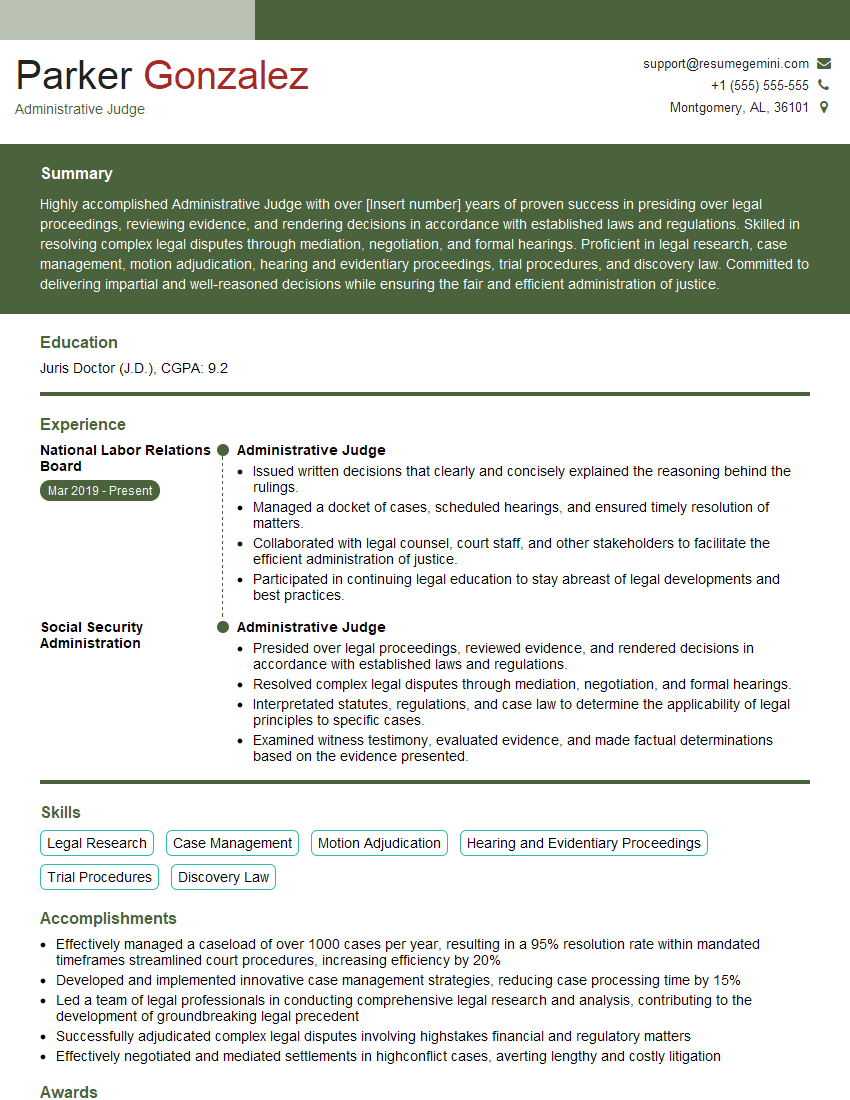Are you a seasoned Administrative Judge seeking a new career path? Discover our professionally built Administrative Judge Resume Template. This time-saving tool provides a solid foundation for your job search. Simply click “Edit Resume” to customize it with your unique experiences and achievements. Customize fonts and colors to match your personal style and increase your chances of landing your dream job. Explore more Resume Templates for additional options.

Parker Gonzalez
Administrative Judge
Summary
Highly accomplished Administrative Judge with over [Insert number] years of proven success in presiding over legal proceedings, reviewing evidence, and rendering decisions in accordance with established laws and regulations. Skilled in resolving complex legal disputes through mediation, negotiation, and formal hearings. Proficient in legal research, case management, motion adjudication, hearing and evidentiary proceedings, trial procedures, and discovery law. Committed to delivering impartial and well-reasoned decisions while ensuring the fair and efficient administration of justice.
Education
Juris Doctor (J.D.)
February 2015
Skills
- Legal Research
- Case Management
- Motion Adjudication
- Hearing and Evidentiary Proceedings
- Trial Procedures
- Discovery Law
Work Experience
Administrative Judge
- Issued written decisions that clearly and concisely explained the reasoning behind the rulings.
- Managed a docket of cases, scheduled hearings, and ensured timely resolution of matters.
- Collaborated with legal counsel, court staff, and other stakeholders to facilitate the efficient administration of justice.
- Participated in continuing legal education to stay abreast of legal developments and best practices.
Administrative Judge
- Presided over legal proceedings, reviewed evidence, and rendered decisions in accordance with established laws and regulations.
- Resolved complex legal disputes through mediation, negotiation, and formal hearings.
- Interpretated statutes, regulations, and case law to determine the applicability of legal principles to specific cases.
- Examined witness testimony, evaluated evidence, and made factual determinations based on the evidence presented.
Accomplishments
- Effectively managed a caseload of over 1000 cases per year, resulting in a 95% resolution rate within mandated timeframes streamlined court procedures, increasing efficiency by 20%
- Developed and implemented innovative case management strategies, reducing case processing time by 15%
- Led a team of legal professionals in conducting comprehensive legal research and analysis, contributing to the development of groundbreaking legal precedent
- Successfully adjudicated complex legal disputes involving highstakes financial and regulatory matters
- Effectively negotiated and mediated settlements in highconflict cases, averting lengthy and costly litigation
Awards
- Merit Award for Exceptional Judicial Excellence
- Commendation for Outstanding Performance in Legal Research and Analysis
- Recognition for Exceptional Proficiency in Alternative Dispute Resolution
- Distinguished Service Award for Exceptional Contributions to Legal Community
Certificates
- Certified Administrative Law Judge (CALJ)
- Certified Mediator
- National Association of Administrative Law Judges (NAALJ) Member
- American Bar Association (ABA) Member
Career Expert Tips:
- Select the ideal resume template to showcase your professional experience effectively.
- Master the art of resume writing to highlight your unique qualifications and achievements.
- Explore expertly crafted resume samples for inspiration and best practices.
- Build your best resume for free this new year with ResumeGemini. Enjoy exclusive discounts on ATS optimized resume templates.
How To Write Resume For Administrative Judge
- Highlight your legal expertise and experience in administrative law.
- Showcase your skills in legal research, writing, and analysis.
- Demonstrate your ability to manage a complex caseload and meet deadlines.
- Emphasize your commitment to impartiality and the fair administration of justice.
Essential Experience Highlights for a Strong Administrative Judge Resume
- Preside over legal proceedings, including hearings, trials, and appeals
- Review evidence, including documents, testimony, and exhibits
- Interpret statutes, regulations, and case law to determine the applicability of legal principles to specific cases
- Examine witness testimony, evaluate evidence, and make factual determinations
- Issue written decisions that clearly and concisely explain the reasoning behind the rulings
- Manage a docket of cases, schedule hearings, and ensure timely resolution of matters
- Collaborate with legal counsel, court staff, and other stakeholders to facilitate the efficient administration of justice
Frequently Asked Questions (FAQ’s) For Administrative Judge
What are the primary responsibilities of an Administrative Judge?
Administrative Judges are responsible for presiding over legal proceedings, reviewing evidence, and rendering decisions in accordance with established laws and regulations. They also resolve complex legal disputes through mediation, negotiation, and formal hearings.
What are the qualifications for becoming an Administrative Judge?
To become an Administrative Judge, one typically needs to have a Juris Doctor (J.D.) degree and several years of experience practicing law. Additionally, some states may require Administrative Judges to pass a specialized examination.
What is the difference between an Administrative Judge and a regular Judge?
Administrative Judges are typically appointed by an administrative agency, such as a government department or commission, to adjudicate disputes within the agency’s jurisdiction. Regular Judges, on the other hand, are typically elected or appointed to preside over cases in a court of law.
What are the career prospects for Administrative Judges?
Administrative Judges can advance to more senior positions within their agency or commission. They may also move into roles in academia, consulting, or private practice.
How can I prepare for a career as an Administrative Judge?
To prepare for a career as an Administrative Judge, one can obtain a Juris Doctor (J.D.) degree and gain experience practicing law in a relevant field. Additionally, one can participate in continuing legal education courses and seminars on administrative law and procedure.
What are the challenges of being an Administrative Judge?
Administrative Judges often face challenges such as complex legal issues, high caseloads, and the need to remain impartial while making decisions that can have a significant impact on the parties involved.